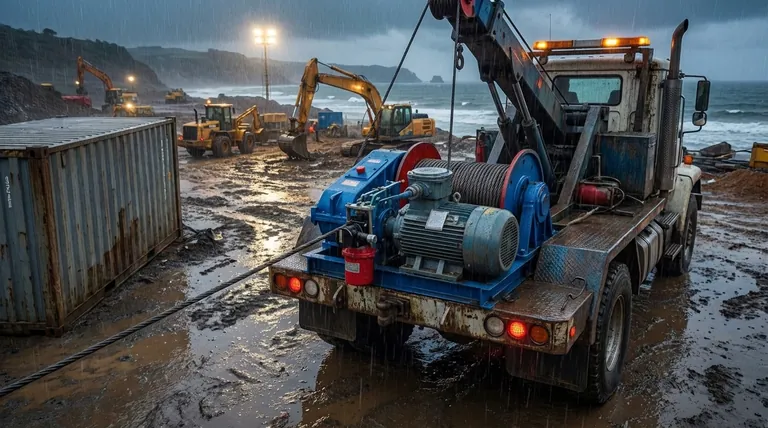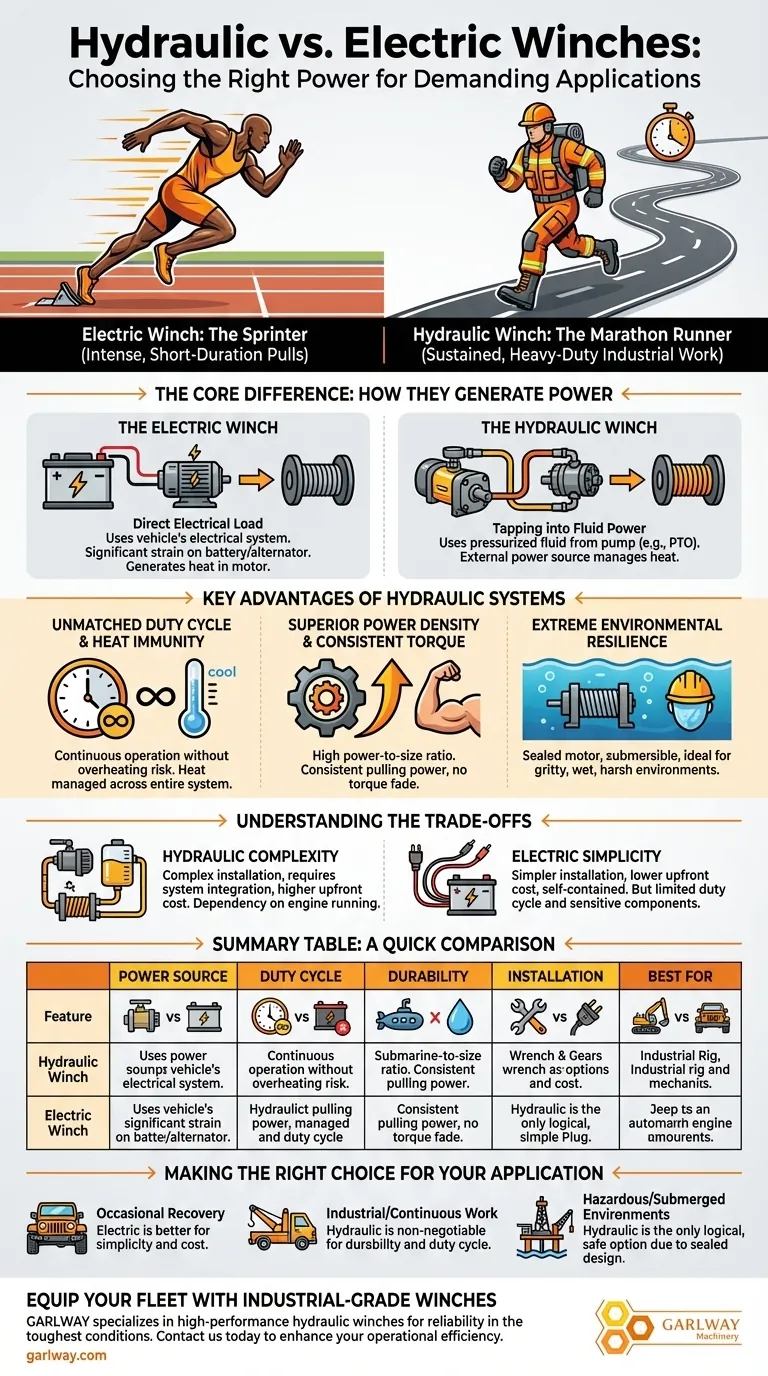When it comes to demanding applications, the advantages of hydraulic winches are rooted in their fundamental design. They deliver superior, continuous pulling power, are effectively immune to overheating during long-duration use, and offer exceptional durability in harsh or even submersible environments where an electric winch would quickly fail.
The core difference is not about which winch is "better," but which is engineered for the task. Electric winches are sprinters, designed for intense, short-duration pulls. Hydraulic winches are marathon runners, built for sustained, heavy-duty industrial work.

The Core Difference: How They Generate Power
Understanding the source of their strength is key to choosing the right tool. The operational principle dictates each winch's capabilities and limitations.
The Electric Winch: A Direct Electrical Load
An electric winch uses its own motor powered directly by a vehicle's electrical system. This makes it a self-contained unit but also places a significant strain on the battery and alternator, generating considerable heat within the motor itself.
The Hydraulic Winch: Tapping into Fluid Power
A hydraulic winch is a component within a larger system. It uses pressurized fluid, typically from a vehicle's power steering pump or a dedicated hydraulic power take-off (PTO), to drive a hydraulic motor. This external power source is the key to its unique advantages.
Key Advantages of Hydraulic Systems
The reliance on a hydraulic system is what gives this class of winch its defining industrial-grade characteristics.
Unmatched Duty Cycle and Heat Immunity
Because the power source (the hydraulic pump) and the motor are separate, heat is managed far more effectively across the entire system. This allows a hydraulic winch to run continuously for long periods without the risk of overheating or motor failure, a common limitation for electric models under heavy load.
Superior Power Density and Consistent Torque
Hydraulic systems are renowned for their high power-to-size ratio. This means a relatively compact hydraulic winch can produce enormous and, more importantly, consistent pulling power. Its torque does not fade as the winch heats up or the battery drains.
Extreme Environmental Resilience
Hydraulic winches are inherently more robust. The sealed nature of the hydraulic motor makes it ideal for gritty, wet, and even fully submersible applications. They are built to withstand harsh marine or industrial environments where an electric motor's sensitive components would be compromised.
Understanding the Trade-offs
Choosing a hydraulic winch involves accepting a different set of complexities compared to an electric model. It is not always the superior choice for every situation.
Installation Complexity and Cost
A hydraulic winch is not a simple bolt-on accessory. It requires integration into a hydraulic system, involving the installation of a pump, a reservoir for fluid, and high-pressure lines. This complexity typically leads to a higher upfront cost for both parts and labor.
Dependency on a Hydraulic Source
The winch cannot operate without its power source. In a vehicle-mounted setup, this means the engine must be running to power the hydraulic pump. This is a critical consideration for recovery scenarios where an engine may be stalled.
The Advantage of Electric Simplicity
In contrast, an electric winch offers far simpler installation, often just requiring heavy-gauge wires run to the battery. While a dual-battery setup is often recommended for heavy use, it can still be a more cost-effective and straightforward solution for many users.
Precision Control Considerations
While hydraulic systems offer excellent variable speed control, modern electric winches can be paired with advanced electronic control systems. These systems can provide exceptionally precise management of load speed and direction, which can be a benefit in delicate lifting or maneuvering operations.
Making the Right Choice for Your Application
Ultimately, your decision must be driven by your primary operational needs, not just a list of features.
- If your primary focus is vehicle recovery and occasional use: The simplicity, lower installation cost, and self-contained nature of a high-quality electric winch are almost always the better choice.
- If your primary focus is industrial work or continuous operation: For applications like tow trucks, marine vessels, or industrial rigs, the durability and non-stop duty cycle of a hydraulic winch are non-negotiable.
- If your primary focus is operation in hazardous or submerged environments: The sealed design and inherent resilience of a hydraulic system make it the only logical and safe option.
Choosing the right winch is about accurately matching the tool's core design to the demands of your work.
Summary Table:
| Feature | Hydraulic Winch | Electric Winch |
|---|---|---|
| Power Source | Vehicle's hydraulic system (PTO/pump) | Vehicle's electrical system (battery) |
| Duty Cycle | Continuous, no overheating risk | Limited by motor heat and battery drain |
| Durability | Sealed motor, submersible, harsh-environment ready | Sensitive to water, dust, and extreme conditions |
| Installation | Complex, requires hydraulic integration | Simple, direct battery connection |
| Best For | Industrial, marine, continuous heavy-duty use | Occasional recovery, simpler setups |
Ready to equip your fleet with industrial-grade winches?
GARLWAY specializes in high-performance construction machinery, including robust hydraulic winches designed for contractors and construction companies who demand reliability in the toughest conditions. Our winches deliver continuous power, extreme durability, and are built to outperform in marine, industrial, and harsh environments.
Contact us today to discuss how a GARLWAY hydraulic winch can enhance your operational efficiency and safety. Get in touch with our experts now!
Visual Guide

Related Products
- Electric and Hydraulic Winch for Heavy Duty Applications
- Electric 120V Boat Winch by Badlands
- Small Electric Winch 120V and 240V for Compact Applications
- Electric Hoist Winch Boat Anchor Windlass for Marine Applications
- 12000 lb Heavy Duty Electric Boat Winch
People Also Ask
- What are the pros of using a synthetic rope for a winch? Discover the Key Benefits for Safety and Performance
- What is considered a large-tonnage winch? Essential Guide for Heavy-Duty Projects
- What is the primary function of a hoisting device in engineering machinery? Unlock Power and Efficiency
- How does the second type of hoist control loads? A Guide to Its Simple, Reliable Mechanism
- How does a hoisting device convert power into lifting or lowering force? Master the Mechanics of Load Movement
- How does an air winch differ from an electric winch? A Guide to Choosing the Right Power Source
- Why might an electric winch be better for solo wheeling? Engine-Independent Lifeline for Ultimate Self-Recovery
- What are the advantages of hydraulic-driven winches? Unmatched Power & Reliability for Heavy-Duty Work















